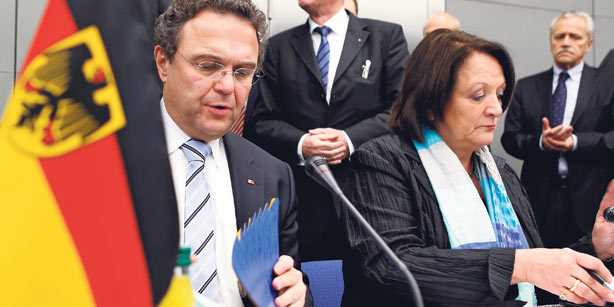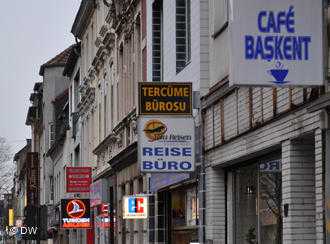German Interior Minister Hans-Peter Friedrich (L), and Justice Minister Sabine Leutheusser-Schnarrenberger, during a summit on Friday to discuss the fight against neo-Nazis.

Turkey will be offering legal counseling services to the victims of racist violence in Germany, according to a statement by the Prime Minister’s Overseas Turks Agency (YTB) on Friday that comes after the discovery that a neo-Nazi cell in Germany with shady links to German intelligence killed at least 10 people, including eight Turkish and one Greek immigrant.
The announcement also comes one day after Foreign Minister Ahmet Davutoğlu urged German officials to find the “extensions” of the Neo-Nazi groups within the German state. The YTB announced on Friday that legal counsel services will be provided to all the victims’ families. YTB President Kemal Yutanç said there was nothing acceptable about a series of murders in Germany over the past ten years that were only recently linked to a neo-Nazi cell. “There is nothing understandable here. We trust foreign countries for the safety of our citizens abroad. Likewise, we are responsible for the safety of people from foreign countries here.” He said the YTB will provide both legal assistance and any other support that the families of the victims might require. He said the YTB will be discussing the issue with the foreign ministry, adding that YTB employees had already begun contacting the families of the Turkish victims.
Head of the parliamentary Human Rights Commission Ayhan Sefer Üstün also made harsh remarks about Germany’s failure to protect immigrants from the murderous gang. He blamed European politicians for the rise in xenophobia in Europe, saying, “Any Neo-Nazi listening to [French President Nicholas] Sarkozy and [German Chancellor Angela]Merkel would be proud of what they are doing.”
Üstün continued his accusations, saying: “Currently, we have about 10,000 immigrants in Hatay near our border with Syria. We can take care of them for years. But they [EU politicians] have changed the Schengen rules to block the possibility that 3,000 immigrants might come in from Libya. Such implementations feed racism.”
He said the commission will thoroughly investigate the incident, where the traces of a structure (inside the state) were visible. Üstün said there was every indication that racism was a major concern, but said Germany ignored all previous signs, including the death of five Turkish citizens in a fire started by Nazis. “There was no effective investigation there,” he said, adding that the Neo-Nazis had relied on the support of sympathizers inside the German state.
Germany was shocked by the murder, with Germany’s Justice Minister Sabine Leutheusser-Schnarrenberger pledging a quick and comprehensive investigation into how a group of neo-Nazis managed to operate under the radar of authorities for years, allegedly killing 10 people and robbing a string of banks.
She acknowledged criticism — focused on the domestic intelligence agency — of the fact German authorities let the gang slip through their fingers until earlier this month, when two founding members apparently committed suicide after police closed in on them following a bank robbery.
“We are all asking how it could be possible that the security authorities allowed a known group of neo-Nazis to go underground at the end of the ‘90s and apparently for over 13 years murder people in various German cities, carry out bombing attacks, and lethally attack police officers,” she said.
Federal prosecutors took over the investigation of the neo-Nazi case on Friday under German anti-terrorism laws, listing the group as a domestic terrorist organization.
The group called itself the National Socialist Underground (NSU).
The investigation into the group’s activities has grown into a nationwide search of previously unsolved crimes, including attacks in Cologne and Düsseldorf from 2000 to 2004 that are now linked to the NSU. Those attacks injured more than 30 people, mostly of foreign origin.
Meanwhile, German officials met at a security summit on Friday to discuss the murders.
Interior Minister Hans-Peter Friedrich and Justice Minister Leutheusser-Schnarrenberger are chairing the meeting, which has a long list of participants including Federal Crime Department (BKA) Chairman Jörg Ziercke; head of the Organization for the Protection of the Constitution (BfV) — the German intelligence service under fire over the murders — as well as state interior and justice ministers and heads of local BfV branches.
Interior Minister Friedrich told the Deutschlandfunk radio station ahead of the meeting that the meeting will see an evaluation of the current state of the investigation and what measures can be taken to avoid a similar incident from happening in the future.
The involvement of the BfV has sparked outrage in the German press as well as among the opposition. Main Opposition Social Democratic Party chairman Sigmar Gabriel, who visited Turkish storeowners in Cologne’s Keupstrasse, known as Little İstanbul, where the NSU detonated a bomb in 2004, said if the perpetrators had been Islamists or the victims had been German, all the streets would be closed, helicopters would be looking for the murderers and all the units of the state would cooperate to find the perpetrators.
Claudia Roth, an MP from Germany’s Green Party, said it was a scandal that the investigators were treating the case as the result of infighting between neo-Nazi groups at a time when the BfV’s involvement is so out in the open.
Gesine Lötzsch, co-chairwoman of the Left Party, said it was against the constitution for BfV members to take part in the activities of the NSU and other extremist groups.
Meanwhile, the Interior Minister of Austria, Johanna Mikl-Leitner, released a statement on Friday saying investigators in her country had found no evidence linking the murders to any Austrian groups. Austria, where extreme rightwing politicians have wide public support of as much as 30 percent, is the usual suspect in neo-Nazi investigations. Leitner referred to the killings as “tragic,” and said she felt sorry for the victims.
Deputy Prime Minister Bekir Bozdağ on Thursday said ensuring the safety of Turkish citizens or non-citizens of Turkish origin in Germany is Germany’s responsibility. “We are in contact with the German authorities. The relevant laws should be implemented fully and the perpetrators should be given the punishment dictated by the law. Investigations should not be delayed or stalled.”
In related developments, a memorial ceremony is planned for three neo-Nazi victims on Nov. 23, 2011, in the city of Mölln. Turkey’s Hamburg Consulate General released a statement on Friday, saying that a ceremony will be organized jointly with the Mölln Municipality, “The Association of Living Together,” a local civil society group, and the Mölln Association of Fatih Mosque to commemorate Bahide Arslan (50) and her grandchildren Yeliz Arslan (10) and Ayşe Yılmaz (18), who were killed 19 years ago in a fire started by Neo-Nazis.

